#john vi of portugal
Text

Albert Gregorius - Portrait of King Joao VI - 1826
Dom John VI (Portuguese: João VI; 13 May 1767 – 10 March 1826), nicknamed "the Clement", was King of the United Kingdom of Portugal, Brazil and the Algarves from 1816 to 1825. Although the United Kingdom of Portugal ceased to exist de facto beginning in 1822, he remained its monarch de jure between 1822 and 1825. After the recognition of the independence of Brazil under the Treaty of Rio de Janeiro of 1825, he continued as King of Portugal until his death in 1826. Under the same treaty, he also became titular Emperor of Brazil for life, while his son, Emperor Pedro I, was both de facto and de jure the monarch of the newly independent country.
John VI was born in Lisbon in 1767 during the reign of his maternal grandfather, King Dom Joseph I of Portugal. He was the second son of the Princess of Brazil and Infante Peter of Portugal, who later became Queen Dona Maria I and King Dom Peter III. John became heir to the throne when his older brother, Prince José, died of smallpox in 1788 at the age of 27. Before his accession to the Portuguese throne, John bore the titles Duke of Braganza, Duke of Beja, and Prince of Brazil. From 1799, he served as prince regent due to the mental illness of his mother. In 1816, he succeeded his mother as monarch of the Portuguese Empire, with no real change in his authority, since he already possessed absolute powers as regent.
One of the last representatives of absolute monarchy in Europe, John VI lived during a turbulent period; his reign never saw a lasting peace. Throughout his period of rule, major powers, such as Spain, France and Great Britain, continually intervened in Portuguese affairs. Forced to flee across the Atlantic Ocean to Brazil when troops of the Emperor Napoleon I invaded Portugal, he found himself faced there with liberal revolts; he was compelled to return to Europe amid new conflicts. His marriage was no less conflictual, as his wife Carlota Joaquina of Spain repeatedly conspired against her husband in favor of personal interests or those of her native Spain.
John lost Brazil when his son Pedro declared independence, and his other son Miguel (later Miguel I of Portugal) led a rebellion that sought to depose him. According to recent scholarly research, his death may well have been caused by arsenic poisoning. Notwithstanding these tribulations John left a lasting mark, especially in Brazil, where he helped to create numerous institutions and services that laid a foundation for national autonomy, and many historians consider him to be a true mastermind of the modern Brazilian state. John's contemporaries viewed him as a kind and benevolent king, although later generations of Portuguese and Brazilians have made him the subject of frequent caricature.
Albert Jacob Frans Gregorius, or Albert Jacques François Grégorius (26 October 1774, Bruges - 25 February 1853, Bruges) was a Flemish-Belgian portrait painter and Director of the art academy in Bruges.
15 notes
·
View notes
Photo
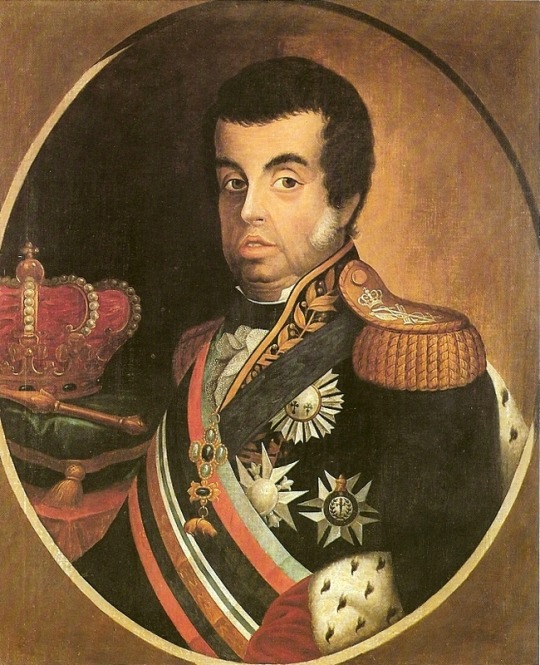
Portrait of John VI of Portugal by Jean-Baptiste Debret.
#Jean-Baptiste Debret#reino de portugal#rei de portugal e dos algarves#monarcas de portugal#john vi of portugal#kingdom of portugal#casa de bragança#house of braganza
8 notes
·
View notes
Text

John VI of Portugal and Carlota Joaquina of Spain.
9 notes
·
View notes
Text
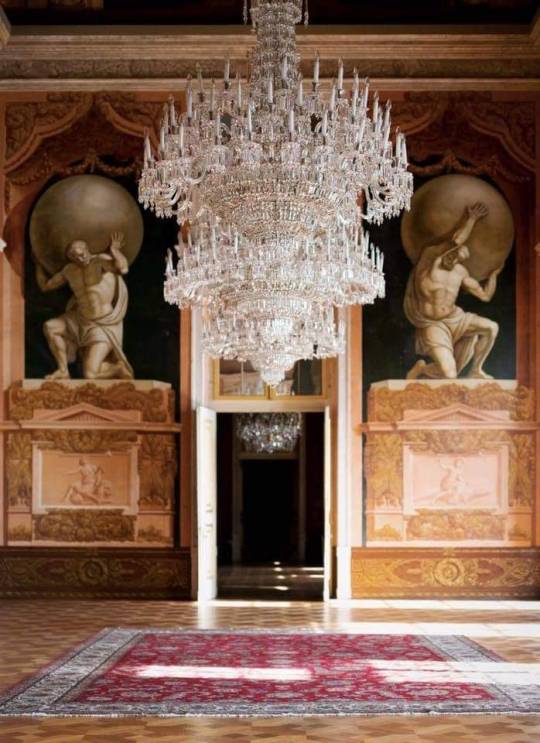
The John VI Room at Ajuda Palace, Lisbon, PORTUGAL
7 notes
·
View notes
Text
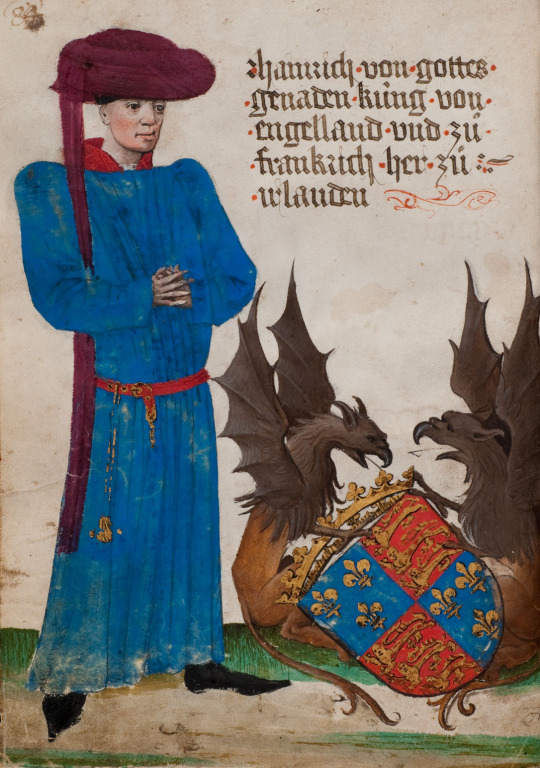
Drawing of Henry VI of England by Jörg von Ehingen.
From 1457-1459, Swabian knight Jörg von Ehingen traveled Europe participating in various campaigns; throughout, he kept a journal and sketchbook of his impressions of the many royal courts he passed through. His compilation includes portraits, in the order of his visits, of Duke Ladislaus V of Austria, Charles VII of France, Henry IV of Castile, Henry VI of England, Alfonso V of Portugal, Janus III of Cyprus, Duke René of Anjou, John II of Aragon, and James II of Scotland.
#we love a contemporaneous portrait from an eyewitness#absolutely dapper hat#you may be familiar with Alfonso V's incredible poulaine shoes and/or his terrible heraldic lion#Henry's got pretty swell poulaines himself#altho I have just noticed his lil skelly hands#plantagenets#manuscript
61 notes
·
View notes
Text
4 portuguese monarchs who might had same-sex relationships:
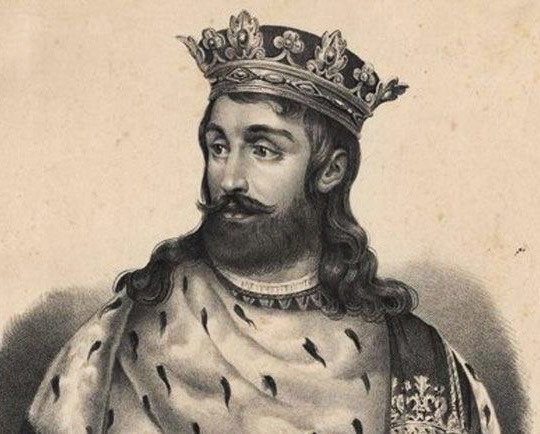
1) Pedro I of of Portugal, certainly, one if the most renowned portuguese monarchs, largely due to the saga of “love and passion” with Inês de Castro. Yet, it was common knowledge that she wasn't the Pedro’s only love: he harboured a passion for his squire, Afonso Moreira, a relationship that ended as disastrously as his other romantic (or not) entanglements. On one fateful occasion, Afonso was caught in bed with Catarina Tosse, wife of Lourenço Gonçalves, who was an esteemed magistrate.
Throughout his reign, Pedro earned the epithet “the Cruel” for his ruthless administration of justice, whereby transgressions of any magnitude often resulted in swift execution. Pedro’s decision to order Afonso’s castration as punishment for his adultery starkly manifested his merciless ethos. Nevertheless, according to Fernão Lopes, a chronicler of portuguese court at the time, in chapter VIII of “Crônica de el-rei D. Pedro I”, his harshness stemmed from a surge of jealousy on the king’s part upon discovering his beloved squire’s relationship with a woman.
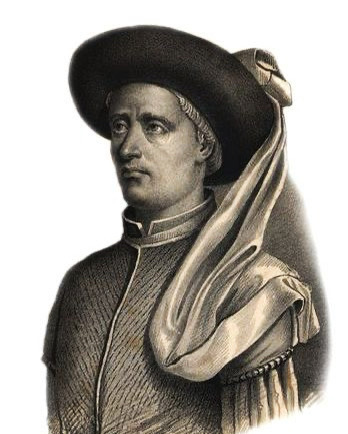
2) Prince Henry, revered as “the Navigator”, occupies a central role particularly during the epoch of maritime exploration.
He was hailed as “chaste prince”, having never entered into wedlock, with no historical accounts suggesting (with certainty) any relationships with women. In the annals of 1444, Henry experienced the loss of a “dear friend” in Ceuta, a tragedy that pluged him into 3 months of profound mourning. Both his father, King John I, and his brother, King Edward, counselled him to “rein in his emotions, lest he indulge men beyond what virtue dictates.”
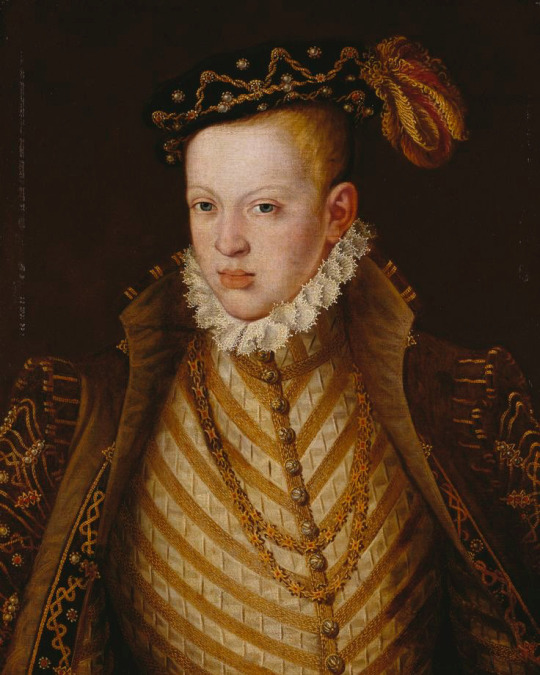
3) King Sebastian contracted gonorrhoea at the age 10/11, a malady documented in medical records at the time that rendered him sexually impotent. Some historians posit that this affliction may have dissuaded Sebastian from pursuing matrimonial unions or romantic relationships with women.
Even though, the “Crônicas de el-rei D. Sebastião” by Friar Bernardo da Cruz recounts an incident during a hunt in the Alentejo, where the entourage of nobles accompanying King Sebastian were stirred by a commotion. Investigating the disturbance, they stumbled upon the monarch locked in an embrance with a fugitive slave amidst the woodland.

4) King Afonso VI, sibling to Queen Catarina of Braganza, earned a reputation for rebeliouness and unruliness from a tender age, yet he harboured no ambitions for kingship.
His reign , marred by a series of missteps, was etched in history for its futile ventures. Despite grappling with severe health afflictions — such as partial paralysis stemming from hemiplegic fever, and scourge of bulimia — Afonso found solace in nocturnal escapades with his inner circle of friends. Among them was António Conti, an intalian peddler of opulent attire and accoutrements to Europe’s nobility. Conti’s sway in Afonso’s court burgeoned as he assumed the role of sartorial advisor and facilitator of introductions to foreign luminaries. Also, both grew increasingly closer to esch other, with Afonso avoiding royal gatherings to spend time with Conti, mostly in his chambers.
In 1666, Afonso took the hand of Maria Francisca Isabel of Savoy, yet their union was fleeting. Maria, citing non-consummation owing to Afonso’s hemiplegia, sought an annulment. In letters to his sister, he bemoaned Maria’s coercive measures, by which she compelled him into relationships with 14 courtesants in a bid to unearth the root of their marital discord.
Seeking to shield Afonso’s sovereignty and secure the portuguese lineage, Luisa de Gusmão, his mother, sanctioned the arrest and subsequent exile of Conti to the distant shores of Brazil.
#i am sorry for how long it is#but i really wanted to post it#so there you have#theres other monarchs to talk about#but these are the ones with the most evidences#pedro i of portugal#prince henry#king sebastian#afonso vi of portugal#historical facts#portugal
13 notes
·
View notes
Note
ana can you explain the liberal wars in simple terms? i visited algarve recently and the tour guide (like yours where it's mostly related to history) talked about the war between the brothers and a guy named remexido(?)
Just yesterday I told my boyfriend to please ask his coworker who graduated in history for a book on the civil war because thats the one thing I'm not good at lmao I didn't even know who Remexido was but apparently he was a guerrilla fighter from the Algarve which yay but fought on the side of Miguelistas which nay
The liberal wars was between Pedro IV of Portugal, better known as Pedro I fo Brazil, who was its first Emperor after declaring its independence, then to quote a brazilian client I had once, homeboy was a better king for the portuguese than he was an emperor for the brazilian... He basically stepped down and answered the plea from Portugal to come back here and kick his brother off the throne.
Now, his brother is Miguel I, the absolutist
Important background is that Portugal was an absolutist country thruoghout the 18th century, which means the king held absolute power. Think Louis the XIV level. Not only does the king have last say about everything government related, he works hand in hand with the church, who is below him (except the Inquisition) and he is celebrated as Godsend's. He is the centre of the universe. Its a time of extravagance, of theatricality, of excess, and the people, as you might imagine, are dirt poor.
This is essentially a kicker into the French Revolution, as you might imagine.
But with portugal, there's the Napoleon problem. Napoleon sends out General Junot to invade Portugal after successfully capturing spain, and on 1808 Junot arrives.
The Portuguese monarchy realised we did not have the arms to face off this guy, and the english, with whom we'd signed a treaty in 1387 and had always upheld it, said they were too busy fighting the french elsewhere... we needed to sort ourselves out. It was obvious by now that an invasion would be unstoppable. We did not have the navy nor the weapons to fight it off. So, the king, John VI, who by now is king because his mother, Maria I, went insane, decided to deceive Napoleon. He uprooted the government and took everyone to BRazil. He established court there and changed the name of his kingdom slightly to the kingdom of Portugal and brazil, it was something like that And then he made the capital city Rio de Janeiro. All in all he took with him about 100.000 people, nobility and court members as well as government. When Junot arrived, he was greeted by a Regency Government that basically said "step right in"
It was a way to show Junot that there was no government to overthrow and that he and his troops had been formally invited. Junot lived here until Napoleon told him to go pound sand somewhere else, and in the time he did, he fucked everyone's wife, lived in complete excess, and angered virtually everyone.
So, two more "invasions" happen, and by the third that's when Wellington and his beef come along to (this time, successfully) fend off the french.
And then, what happened was that this single event changed the country forever.
You'd be surprised to find how many in portuguese society were for Napoleon. Overall in Europe Napoleon was seen as the dude who was going to change the modern world, and it was actually accepted that he was undefeatable. When looking at the case of Portugal and Spain, most countries just went "submit bro there's no turning around". So it was a bit of a surprise that in the end backwards catholic portugal and the english won.
For example, the painter Vieira Portuense, arguably the most celebrated artists of portuguese neo-classicism and someone who met and hung out with Angelica Kauffmann, was so in favour of Napoleon not only was he arrested for it, he had to leave the country to escape persecution. There are paintings of him that originally had Napoleon's eagle hidden in it, but he had to repaint it to not offend anyone.
Basically, Napoleon offered a liberal alternative to the absolutist nightmare that was our country. Napoleon was the opposite of what Portugal was: a country ruled by a royal family who relished in absolute excess and also ruled by the church, and a country where the church held not just a monopoly on riches but controlled the country, so much so that the inquisition was still here despite the Marquis of Pombal's efforts to reduce its power. And a country that was mostly rural, ignorant, illiterate and extremely, painfully catholic. Liberals saw in Napoleon the chance to grow past this, embrace enlightenment, to evolve past catholic fervor.
These ideals, even long after Napoleon's death, will remain. Napoleon will influence the country enough that it will infect it with new liberal ideas and change the 19th century forever.
The absolutist monarchy stood against everything Napoleon defendedm because if those things were abolished, they would go to shit.
So when the french are kicked out, the english stay. General Beresford basically becomes a de facto king in the king's absence, because John VI turns out enjoyed the brazilian weather a lot more.
Now excuse me cause this is the part I'm not too familiar with. I was actually looking at a series of books by Laurentino Gomes on the topic. he's a brazilian historian who wrote about the portuguese court in brazil and slavery, so here's a tip for those like me who want to know where to start. What I'm not very familiar with is the court in brazil.
Basically, at a certain point, the king is forced to come back and get rid of General Beresford. The anti-british sentiment in the country that prevailed through the 19th century starts here, with Beresford benefitting a lot of his countrymen and repressing anyone who stands against him. THe book Felizmente Há Luar, which we had to study in school and is about the failed revolt by Gomes Freire, is about this exact fact.
There's a character here I haven't mentioned. Carlota Joaquina, wife of John VI, and arguably the vilest woman to have ever lived in this country. By "vile" I mean, spotting a hot guy on the way, finding out who he is, and having his wife killed so she can fuck him. It's downright insane. And Carlota Joaquina was the great manipulator behind her son, Miguel I.
WHile the royal family comes back to portugal, Pedro IV stays in Brazil. What led to the Ipirange scream is another thing I'm not familiar wiht but the presence of the royal family in Brazil reinforced the wish for independence. Maybe a brazillian follower can chime in and explain this a lot better (I'd actually REALLY appreciate that!!)
Pedro IV ends up declaring Brazil an Empire, this becoming Pedro I. I think it's shortly after that John VI, the man who hid chicken legs in his coat pockets out of fear of being poisoned, died by poison. Thus, his son Miguel gets to the throne
Now Liberal sentiment since Napoleon had grown considerably, and by now, Miguel is not happy, so he conducts a "purge". He leads a very repressive regime against Liberals, which lead them to contact Pedro in Brazil and ask him to come here and get rid of his brother.
I seriously don't know what leads to Pedro stepping down and his daughter Maria ascending to the throne (again, if another brazilian wants to either fact check me or teach me, I'm more than happy to hear), but Pedro comes to Portugal precisely to fight a war against his brother.
And that's the civil war.
Listen, in the middle of all of this, the root cause of the fight, is the Constitutional Charter. The Constitutional Charter had been approved in 1821, but barely upheld. I believe Miguel's mistake was to refuse the Constitutional Charter, as it was against absolutist ideals. Think of the constitutional charter as something like the 19th century Magna Carta, what limited a king's ability to jsut rule over everything and delegate the government to a parliament.
Another point of contention was the church. By now, the Inquistion is finally abolished (1820) but the church still holds IMMENSE power over the country. Liberals want something VERY CLOSE to a secular state. They want the people to have access to education outside of the church, and they want the extinction of monastic orders (which they will achieve in 1834). The absolutists can only exist with the church and its power, so Miguel is naturally against this.
Pedro IV ends up winning the war, and his brother is sentenced to exile and signs a contract stating his side of the family can never, ever take the throne. Fun fact: the "Duque of Braganza", the only remnant of the royal family we have today and who is at the head of the monarchist party, actually descends from Miguel. So you want to have an argument against him, just say "maybe your ancestor shouldn't have lost the war".
I don't know much about the liberal wars, but I know that, like the war againsat napoleon, it involved a lot of guerrilla. A notorious moment was the siege of Porto, in which Porto held strong agaisnt the absolutists (so, Miguel) so spectacularly (they even bombed Clérigos), Pedro IV left it in his will that his body should be buried in Brazil but his heart belonged to Porto. His heart is still there lmao
Again, if any brazilian reading this wants to add whatever, I'm more than happy to hear cause this is an episode of both our histories I am lacking in a lot
16 notes
·
View notes
Text
#JON SNOW FORTNIGHT EVENT 2023
@asoiafcanonjonsnow
DAY 10: ECHOES OF THE PAST 🗝️📜(2/2) ->
Historical parallels with Medieval bastard Kings.
John I of Portugal
To complete the the previous post of this meta, we're going to dive in the parallels and simmilarities between Jon Snow and John I of Portugal through the following points:
BASTARDY
John I of Portugal also known as John of Avis, was the bastard son of King Peter I of Portugal and Teresa Guille Lourenço, a Galician noblewoman, lady in waiting of Inês de Castro, or according to other sources, the daughter of some Lisbon merchants.
Jon Snow is officially known to be Ned Stark's bastard son, and if we consider R+L=J, he's Prince Rhaegar and Lyanna's son, and as far as we know Jon is still a bastard.
PARENT'S TRAGIC LOVE STORY
John I's father, Peter I of Portugal fell in love with Inês, a lady in waiting and cousin of Constanza Manuel de Villena (Peter's wife).
After Constanza died, they became lovers and they had four children and they wed in secret, but some Portuguese nobles and Peter's father, Afonso IV of Portugal, disliked their relationship because the possible influences of Inês' family. They plotted to kill her, Inés was killed by three of those men and it's said that when Peter became king, he put Inês' corpse in a throne next to him so that the people would swear allegiance to her as queen of Portugal and looked for revenge chasing the ones who killed Inês. John I was born a few years after Inês died when Peter I had an affair with Teresa Lourenço.
Jon's parents, Rhaegar and Lyanna met at the Harrenhal Tourney, in which both participated, Lyanna as the Knight of the Laughing Tree, Aerys sent Rhaegar some men to learn the identity of the mystery knight, so it's likely that Rhaegar figure it out and then crowned her as Queen of Love and Beauty when he won the tourney. They fell in love and run away together, Rhaegar died at the Battle of the Trident during Robert's rebellion and Lyanna died after giving birth to Jon at the Tower of Joy.
BROTHER IS THE KING
After Peter I of Portugal died, he was succeeded by his son with Constanza Manuel de Villena, Ferdinand I, and John held a prominent position during the reign of his brother.
Jon is a brother of the Night's Watch when Robb is proclaimed as King in the North and during his brief reign.
Apart from that it would be argued that Aegon VI fits here too because he's Jon's brother, but Young Griff's identity as Aegon VI is doubtful and he hasn't taken control of Westeros yet.
MILITAR EDUCATION AND CAREER
John was educated by Nuno Freire de Andrade, Master of the Order of Christ, and John became Master of the Order of Avís, one of the most important Orders in Portugal during the Middle Ages, from which he will take his last name.
Jon joined the Night's Watch, which can also be considered a militar order in which chastity is also imposed on its members just like the Order of Avis. Jeor Mormont, Lord Commander of the Night's Watch has been one of Jon's mentors, so just like John, Jon had the leader of a militar order as a mentor, and then became the head of a militar order.
RELATIONSHIPS/LOVE INTERESTS
While John formed part of the Order of Avis, despite vows of chastity, John had two bastard children with Inês Pires when he was a teenager, Beatrice and Afonso, 1st Duke of Braganza.
Jon broke his vows by falling in love and being with Ygritte, even though Jon didn't had children with Ygritte, and Jon has also expressed that he didn't want to have them because of the stigma of being a bastard and the classist Westerosi society.
POLITICAL MATCH MAKER
John was one of the negotiators of the successive marriage projects of his niece and the heiress Beatrice of Portugal, who would end up marrying John I of Castile (Henry II of Castile's son), as a way to seal peace after the Fernandine Wars, in which Ferdinand I tried to overthrow Henry II from the Castilian throne, who became king after killing his legitimate brother Peter I of Castile (who was Ferdinand I's cousin), and was supported by one of Peter I's legitimised bastard children, Constance of Castile.
In the agreements established that each one would independently reign their kingdoms and the offspring of both would inherit Portugal, although if Beatrice died without children, the heirs of her husband would inherit Portugal, and John I of Castile has children from a previous marriage to Eleanor of Aragon (this is important detail for later).
Jon has also arranged a wedding of a familiar during his time as head of the militar institucional, as the Karstarks originated as a cadet branch of the Starks, and there have been intermarriages between the two houses, so we could assume Alys and Jon are distant cousins, such as Alys and Sigorn's wedding.
PROBLEMS OF SUCESSION AND INDEPENDENCE OF THEIR KINGDOMS & THEIR RISE TO KINGSHIP
After the death of Ferdinand I, a succession crisis took place in Portugal between Beatrice, who had no offspring, and the children of Peter I of Portugal with Inés de Castro (who were considered bastards by the Portuguese nobility), and also John revolted at end of 1384 with the support of the commonfolk and the bourgeoisie, and promoted a war to maintain the independence of Portugal, adopting the title of defender of the kingdom, which he achieved by defeating Beatrice and John I of Castile, for which he was crowned king of Portugal, being the first king and founder of the House of Avis.
Due to what happened to John with the fight for the independence of Portugal against another family member, it is most likely that in TWOW when Jon arrives in Winterfell the inheritance problem between the Starklings will have to be solved, and with Robb's will and his position as the older brother and being the one with political experience, supported by the Free Folk, the Mountain Clans and some Northern Noble Houses like the recently created House of Thenn, formed by Alys and Sigorn, Jon will be named king in the North breaking relations with the Iron Throne that is under the control of the Lannisters and the North will be (for the moment) independent again. In addition, the matter of Beatrice and her husband John I of Castile reminds me a bit of the marriage of Sansa and Tyrion, being Tywin's initial plan to get the North under the rule of the Lannisters, although that did not work and the best method was having the Boltons at Winterfell. Plus both Tyrion and John I of Castile have lions in their sigils, although the Castilian lion is purple (or in some media, red) and the Lannister one is golden.
ALLIANCES, MARRIAGE & OFFSPRING/POSSIBLE MARRIAGE (SPECULATIONS)
Like his brother Ferdinand I, John supported Constance's cause, allying with her against John I of Castile, but they were defeated and Constance did not get the Castilian throne, her daughter Catherine of Lancaster married John I of Castile's son, Henry III, and their son was John II of Castile, thus uniting the two lines of succession of Alfonso XI of Castile.
As well as Peter I of Castile's two eldest surviving daughters married two of Edward III of England's sons (Constance married John of Gaunt, 1st Duke of Lancaster and Isabella married Edmund of Langley, 1st Duke of York), John I of Portugal married Philippa of Lancaster, John of Gaunt's eldest daughter with Blanche of Lancaster, and they had a loving marriage and eight children: Blanche, Afonso, Edward I of Portugal, Peter, Henry, Isabella, John and Ferdinand.
Edward was a poet and writer, his more important books were, on good governance,'The Loyal Counselor', 'Book of Councils', 'Response, being princes, to the infant D. Ferdinand about some complaints he had of his father'; on sports and horsemanship, with educational connotations, 'Teaching book about riding well in any saddle' and "Regiment to learn to play weapons'.
It's very likely that Jon will need to make more alliances to stablish his position as King in The North and preparing for the War for the Dawn and fight against the Others, and one way to do it it would be marrying someone with a prominent influence and a big army.
And although Dany hasn't landed on Westeros yet, due to her army and her influence as queen claimant to the Iron Throne, could be a good ally, and Dany would like to help due to her care for people who are needed, so probably Jon and Dany would join forces and eventually they could fall in love, marry and rule Westeros together.
Plus, if Jon ans Dany have children, one of them could be a poet like Edward I or a music composer and a bookworm like Rhaegar.
CUNNING/KNOWLEDGE
Contemporary writers state John that his position as a master of a religious military order made him an exceptionally learned king for the Middle Ages. His love for knowledge and culture was passed down to his children, who are collectively referred to by Portuguese historians as the illustrious generation, for example, Edward I the Eloquent and Peter were considered as two of the most learned princes of their time, and Henry the Sailor invested heavily in science and in the development of nautical activities.
Although Jon is often seen as a warrior, he has shown interest on knowledge and books too and he has been showing competences and skills for being a good leader and he's cunning good at politics and a good administrator, as he has been proving during his time as Lord Commander of the Night's Watch.
DRAGON IMAGERY
John I of Portugal's sigil has some elements that make me link him with Jon, his emblem has a crest with a dragon, which was usually used in the heraldry of the Portuguese Royal family, in which a dragon appears in the Royal crest or two green dragons as the supports of coat of arms, which makes me think of Rhaegal, a green dragon, who was named after Rhaegar and most likely Jon is its dragonrider.
#jonsnowfortnightevent2023#jonsnowfortnightevent#jon snow#meta#canonjonsnow#canonjon#jon meta#asoiaf meta#day 10#echoes of the past#historical parallels#john i of portugal#João I#medieval bastard kings
30 notes
·
View notes
Note
Who are your muses best friends?
Arthur's best friends are: @bertievi's George VI; @admiraltyspride's Lord Nelson; @ageofxail's Daniel/America (husband!!!), Noel/England & Royal Navy; my Jack/London; & @xbasilrp's Toni/Spain (spicy boyfriend).
Not quite besties but very close platonically (unless otherwise noted) are @terrorcaptain's Crozier (very father-son tbh); Thera at @therapardalis; Mycroft at @governmentofficial (also husband!); @hope-on-hope-ever's John Franklin (friends/colleagues in general but also estranged father and bastard son in THAT ONE AU); endearingly fond of @imprvdente's Fish; & Pris at @herstoriies
@honorhearted gets an honorable (ha!) mention because of how complicated Ben and Art's relationship is. Arthur admires Ben but also wants to punch him in the nose. Arthur enjoys punching things though, so take that with a whole spoon of salt. He genuinely wants the Americans to win and believes Ben to be a properly good man--part of the reason he razzes Ben like he does is because there's really no other way (in Art's opinion) to try and shake Ben out of seeing the war as a largely black and white problem. He sees a lot of himself in Ben--they are both educated, stubborn, hot-headed, and courageous in stupid ways, and they both have a heart. Arthur doesn't want to see America get its start as a country with all of the kindness burned out of all its founders. They are... complicated.
I don't like to go godmode people, but Art's "default" is that he is besties with Portugal, France, India, U.S. America. However, I handle that on a case-by-case basis because, again, it would be shitty of me to force that decision on other writers.
Goodsir's besties are: The Henry Collins that lives in my head; @tooxldtorememxer's John Irving; @herstoriies' Priscilla (big fat crush on her too tbh!!!!!); @therapardalis; @terrorcaptain; Silna at @tatteredxsails; @bertievi of course; he's also pretty close with @ageofxail's Noel; & @imprvdente's Fish; & he has........ complicated feelings about @honorhearted's Ben.
Thomas Blanky's besties are: @wantsusdead's Francis (I mean we just started threading but LISTEN-); oh also @terrorcaptain's Francis (+ husband); he's also super fond of @admiraltyspride too; can't forget about the Sidebear, thank u @tatteredxsails; & if I get my way he's going to continue to 'Dad' at @imprvdente!!!!!
The Railroad Man has no besties because he's an abject piece of sh oh wow, Moriarty actually!! @multipleoccupancy
#.// hope perches in the soul (ooc)#.// ruled the waves (arthur)#.// go with the floe (blanky)#.// schrodinger’s doctor (goodsir)#.// lupus in fabula (trm)#.// no frigate like a book (headcanons)
11 notes
·
View notes
Note
Alicent’s fans believing “bastards are monstrous by nature.”
And then, you have incredibly sweet and good children like Tommen and Myrcella. 😭
Bastardy is a legal existence, not a biological one. Like race, though it does have real-world consequences, it is still a construct and should not be seen as an inherent fact.
Therefore, even "legally", Tommen and Myrcella are not even bastards, because Robert Baratheon -- knowing -- or at least in some deep pot in his brain suspecting -- that they aren't his -- accepted them as his kids for his own good. (*EDIT* he didn't know)
Really they are and they aren't, but we won't get into that.
Why?
A)
To maintain his image of not being cuckolded.
B)
Because Tywin Lannister is still his main support and the reason he even was able to successfully rebel and gain the throne. Plus he's genuinely scared of him.
C)
As many male monarchs and lords did throughout medieval and recent history, so that he could have heirs (or/and ensure their already existing "trueborn" kids' parentage do not get suspected...or reduce the suspicion). Eleanor Herman, in Sex with the Queen, says as much in the introduction of the book:
With regard to royal children, the only consideration more important than their kingly blood was the monarch’s self-interest. Many kings acknowledged children they knew had been fathered by someone else. Often, kings did not want to cast doubt on the paternity of older children they knew to be their own. In the case where the king could not father children, sometimes court factions heartily desired the queen to bear bastards in order to stabilize the throne and cement their own interests.
Fortunately, the queen’s complete and utter disillusionment with her husband usually set in after the birth of the heir. And so it was not deemed worthwhile to lose international prestige, throw the nation into tumult, and question the paternity of all royal children, simply to deny the one cuckoo in the robin’s nest. In the early nineteenth century, the last son of King John VI and Queen Carlota Joaquina of Portugal was extremely good-looking and slender - unlike either of his parents - and happened to be the spitting image of the handsome gardener at the queen’s country retreat. Other than a few snickers behind painted fans, no one said a word.
D) *EDIT*, corrected by ladystonewolf in comments below
As GRRM said, Robert also genuinely didn't think that anyone physically weaker than him would dare to disobey, rebel or plot against him and his strength in any sort of way, much less his bound-to-him wife/a woman.
........................................................................................
All that being said, yes those are sweet kids and Myrcella has a backbone. The idea that children born out of wedlock are inherently evil, disloyal, overly-ambitious, and weak is untrue.
I mean: William the Conqueror, Orys Baratheon, Brynden Rivers, Jon Snow, Jon of Gaunt’s children (ancestors of today's British monarchy), Benedict Rivers/King Benedict Justman, and so many more!
#asoiaf asks to me#westerosi bastards#asoiaf#myrcella baratheon#tommen baratheon#fandom critical#fandom commentary#asoiaf fandom#fandom classism#fandom discrimination#eleanor herman
42 notes
·
View notes
Text
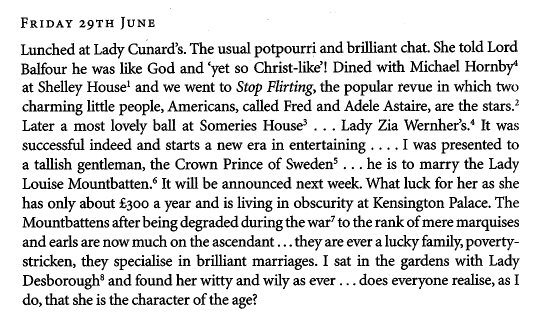
Henry ‘Chips’ Channon: The Diaries (Vol. 1), 1918-38, entry for 29th June 1923
—
Friday 29th June
Lunched at Lady Cunard’s. The usual potpourri and brilliant chat. She told Lord Balfour he was like God and ‘yet so Christ-like’! Dined with Michael Horby¹ at Shelley House² and we went to Stop Flirting, the popular revue in which two charming little people, Americans, called Fred and Adele Astaire, are the stars.³ Later a most lovely ball at Someries House⁴ ... Lady Zia Wernher’s.⁵ It was successful indeed and starts a new era in entertaining .... I was presented to a tallish gentleman, the Crown Prince of Sweden⁶ ... he is to marry the Lady Louise Mountbatten.⁷ It will be announced next week. What luck for her as she has only about £300 a year and is living in obscurity at Kensington Palace. The Mountbattens after being degraded during the war⁸ to the rank of mere marquises and earls are now much on the ascendant ... they are ever a lucky family, poverty-stricken, they specialise in brilliant marriages. I sat in the garden with Lady Desborough⁹ and found her witty and wily as ever ... does everyone realise, as I do, that she is the character of the age?
—
1. Michael Charles St John Hornby (1899-1987), son of St John Hornby, was the founding partner of WH Smith.
2. The Hornby family’s house in Chelsea.
3. Frederick Austerlitz (1899-1987), who took the name Fred Astaire, was an American actor, dancer and singer who achieved worldwide fame in the 1930s in a series of Hollywood musicals renowned for their dance routines; and his sister Adele Marie (1896-1981), with whom he began a vaudeville act as children as 1905, when they changed their name to Astaire. By 1923 they had a Broadway act, which they were touring in London.
4. A Crown State property rented by the Wernhers in Regent’s Park, designed by John Nash and damaged by bombing during the Second World War. It was demolished in 1958.
5. Countess Anastasia Mikhailovna of Torby (1892-1977), elder daughter of the Grand Duke Michael Mikhailovich of Russia, and therefore a great-granddaughter of Tsar Nicholas I. She married, in 1917, Harold Wernher (1893-1973), later 3rd Bt. She was granted the rank and precedence of an earl’s daughter after her marriage and stopped using her Russian title, being known as Lady Zia Wernher thereafter.
6. Oscar Fredrik Wilhelm Olaf Gustaf Adolf (1882-1973), from 1950 King Gustaf VI Adolf of Sweden. He was the widower of Princess Margaret of Connaught (1882-1920), whom he had married in 1905; she was the cousin of King George V, and had died suddenly while eight months pregnant with her sixth child.
7. Louise Alexandra Marie Irene Mountbatten (1889-1965), previously Princess Louise of Battenberg, married the Crown Prince of Sweden (vide supra) in 1923, and was Queen Consort of Sweden from 1950. She was daughter of Prince Louis of Battenberg, who became 1st Marquess of Milford Haven when renouncing the German titles in 1917. She had earlier turned down proposals from King Manuel II of Portugal and had been secretly engaged to Prince Christopher of Greece, who was unable to marry her because he had no money; a second engagement was to Stuart Hill, an artist, whom she met while nursing in the Great War and who turned out to be homosexual.
8. There was a protracted debate between Lloyd George, King George V and Lord Stamfordham, the King’s private secretary, in 1917 about the titles to be bestowed on German members of the King’s family who had pledged allegiance to him and had been prepared to forfeit their German ranks. The King was cautioned against granting too many titles and to avoid bestowing any dukedoms. The Mountbatten marquessate was a compromise and their rise would indeed be unstoppable, with the surname of members of the House of Windsor becoming Mountbatten-Windsor in 1960, thirteen years after the marriage of the future Queen Elizabeth II to Philip Mountbatten.
9. Ethel ‘Ettie’ Fane (1867-1952), married in 1887 William Henry Grenfell (1855-1945), 1st Baron Desborough, a former Liberal MP who had joined the Conservatives in 1893 over his disagreement with the second Home Rule Bill for Ireland. Their three sons (qqv) predeceased them, two killed in the Great War and a third in a car crash.
#chips channon#channon diaries#1923#1920s#emerald cunard#arthur balfour#michael hornby#fred astaire#adele astaire#zia wernher#gustaf vi adolf#louise mountbatten#ettie desborough#🕰️
7 notes
·
View notes
Text
Events 1.1 (before 1830)
153 BC – For the first time, Roman consuls begin their year in office on January 1.
45 BC – The Julian calendar takes effect as the civil calendar of the Roman Empire, establishing January 1 as the new date of the new year.
42 BC – The Roman Senate posthumously deifies Julius Caesar.
193 – The Senate chooses Pertinax against his will to succeed Commodus as Roman emperor.
404 – Saint Telemachus tries to stop a gladiatorial fight in a Roman amphitheatre, and is stoned to death by the crowd. This act impresses the Christian Emperor Honorius, who issues a historic ban on gladiatorial fights.
417 – Emperor Honorius forces Galla Placidia into marriage to Constantius, his famous general (magister militum) (probable).
947 – Emperor Tai Zong of the Khitan-led Liao Dynasty captures Daliang, ending the dynasty and empire of the Later Jin.
1001 – Grand Prince Stephen I of Hungary is named the first King of Hungary by Pope Sylvester II (probable).
1068 – Romanos IV Diogenes marries Eudokia Makrembolitissa and is crowned Byzantine Emperor.
1259 – Michael VIII Palaiologos is proclaimed co-emperor of the Empire of Nicaea with his ward John IV Laskaris.
1438 – Albert II of Habsburg is crowned King of Hungary.
1500 – Portuguese explorer Pedro Álvares Cabral discovers the coast of Brazil.
1502 – The present-day location of Rio de Janeiro, Brazil, is first explored by the Portuguese.
1515 – Twenty-year-old Francis, Duke of Brittany, succeeds to the French throne following the death of his father-in-law, Louis XII.
1527 – Croatian nobles elect Ferdinand I, Archduke of Austria as King of Croatia in the 1527 election in Cetin.
1600 – Scotland recognises January 1 as the start of the year, instead of March 25.
1604 – The Masque of Indian and China Knights is performed by courtiers of James VI and I at Hampton Court.
1651 – Charles II is crowned King of Scotland at Scone Palace.
1700 – Russia begins using the Anno Domini era instead of the Anno Mundi era of the Byzantine Empire.
1707 – John V is proclaimed King of Portugal and the Algarves in Lisbon.
1739 – Bouvet Island, the world's remotest island,[21] is discovered by French explorer Jean-Baptiste Charles Bouvet de Lozier.
1772 – The first traveler's cheques, which could be used in 90 European cities, are issued by the London Credit Exchange Company.
1773 – The hymn that became known as "Amazing Grace", then titled "1 Chronicles 17:16–17, Faith's Review and Expectation", is first used to accompany a sermon led by John Newton in the town of Olney, Buckinghamshire, England.
1776 – American Revolutionary War: Norfolk, Virginia is burned by combined Royal Navy and Continental Army action.
1776 – General George Washington hoists the first United States flag, the Grand Union Flag, at Prospect Hill.
1781 – American Revolutionary War: One thousand five hundred soldiers of the 6th Pennsylvania Regiment under General Anthony Wayne's command rebel against the Continental Army's winter camp in Morristown, New Jersey in the Pennsylvania Line Mutiny of 1781.
1788 – The first edition of The Times of London, previously The Daily Universal Register, is published.
1801 – The legislative union of Kingdom of Great Britain and Kingdom of Ireland is completed, and the United Kingdom of Great Britain and Ireland is proclaimed.
1801 – Ceres, the largest and first known object in the Asteroid belt, is discovered by Giuseppe Piazzi.
1804 – French rule ends in Haiti. Haiti becomes the first black-majority republic and second independent country in North America after the United States.
1806 – The French Republican Calendar is abolished.
1808 – The United States bans the importation of slaves.
1810 – Major-General Lachlan Macquarie officially becomes Governor of New South Wales.
1822 – The Greek Constitution of 1822 is adopted by the First National Assembly at Epidaurus.
2 notes
·
View notes
Photo
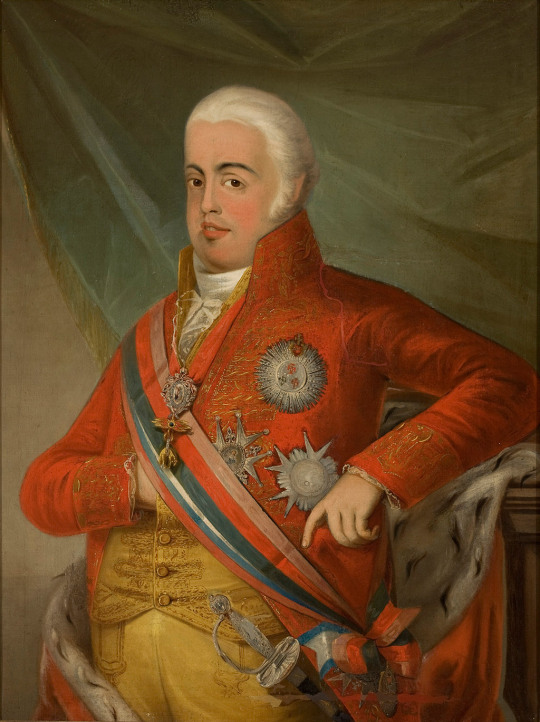
Portrait of João VI, King of Portugal. By Domingos Sequeira.
#domingos sequeira#monarcas de portugal#king john vi of portugal#casa de bragança#reino de portugal#rei de portugal e dos algarves#kingdom of portugal#house of braganza
7 notes
·
View notes
Text
SAINT OF THE DAY (September 1)
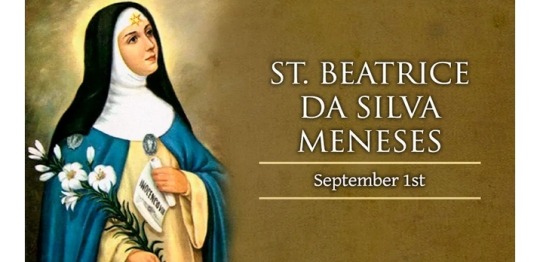
St. Beatrice was born to Portuguese nobility in 1424 in Cuerta, Portugal.
She was one of the eleven children of Rui Gomes da Silva, the governor of Campo Maior, Portugal, and Isabel de Menezes, an illegitimate daughter of Dom Pedro de Menezes, 1st Count of Vila Real and 2nd Count of Viana do Alentejo, in whose army her father was serving at the time of her birth.
One of her brothers was Amadeus of Portugal, a noted reformer of the Order of Friars Minor.
She was raised in the household of the future Queen Isabel of Portugal and spent some time in her royal court in Castile following the Queen's marriage to John II.
She soon got tired of the empty life at court and joined a Cistercian convent in Toledo.
She lived at the convent until 1484, when she answered a summons from God to found a religious order.
The Congregation of the Immaculate Conception of the Blessed Virgin Mary was begun, and with the help of the Queen, she founded a house outside of Toledo where she lived and served as superior until her death on 16 August 1492.
She was beatified by Pope Pius XI on 28 July 1926. She was canonized by Pope Paul VI on 3 October 1976.
Her feast day is celebrated by both by the Conceptionist nuns and the Franciscan Order and in Spain on September 1.
However, in 2012, it was transferred to August 17 for Portugal.
4 notes
·
View notes
Text

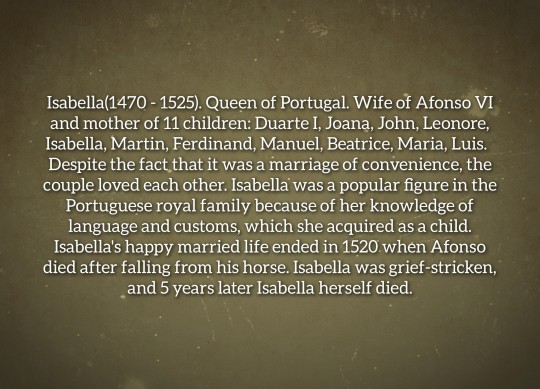
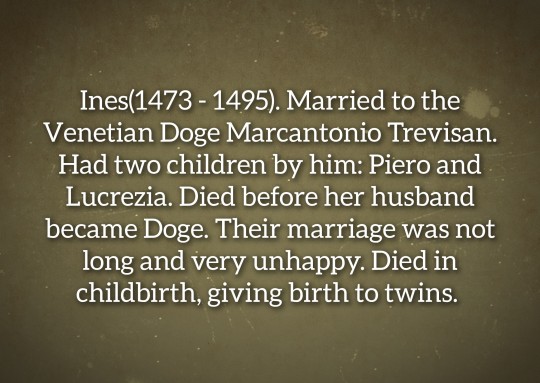
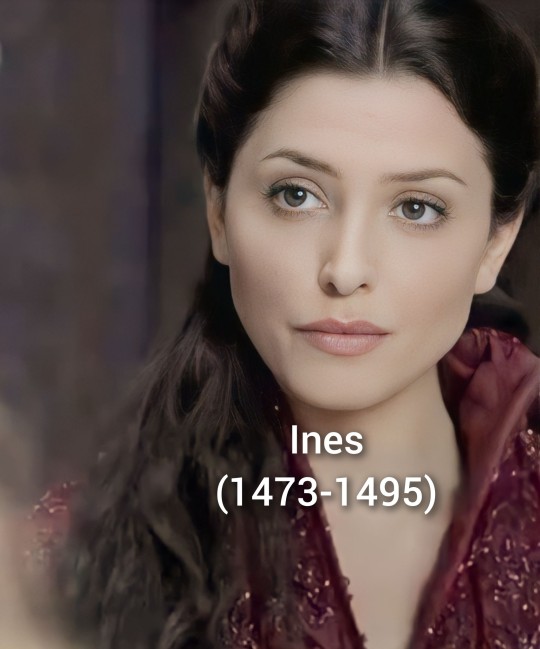

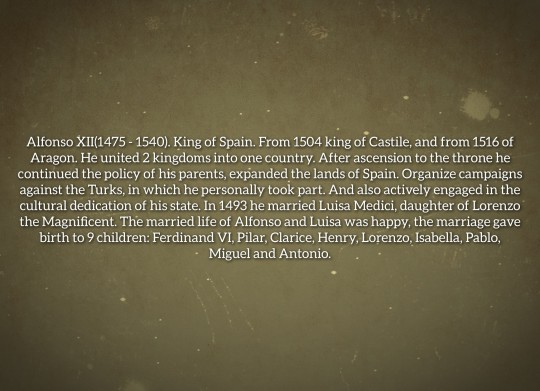
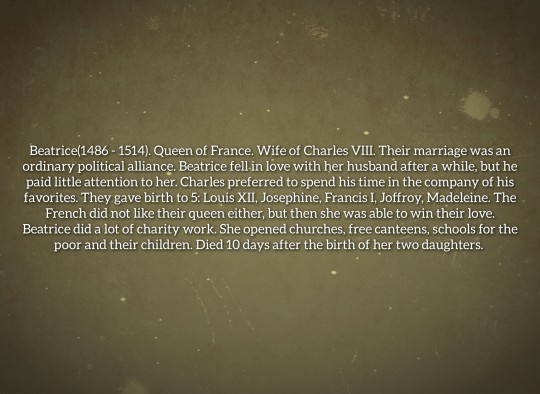
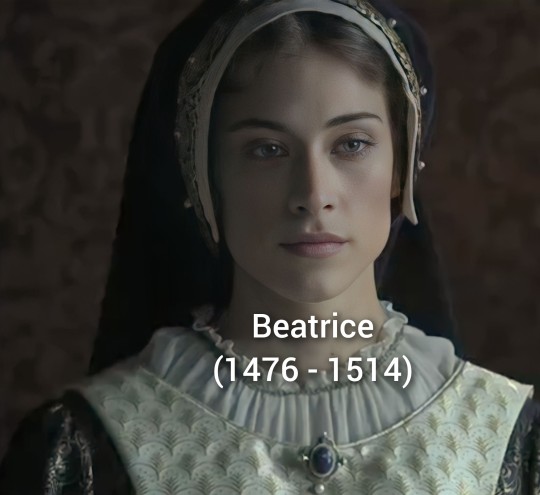


AU House of Trastamara: Children Isabella of Castile and Ferdinand of Aragon.
Isabella(1470 - 1525). Queen of Portugal. Wife of Afonso VI and mother of 11 children: Duarte I, Joana, John, Leonore, Isabella, Martin, Ferdinand, Manuel, Beatrice, Maria, Luis. Despite the fact that it was a marriage of convenience, the couple loved each other. Isabella was a popular figure in the Portuguese royal family because of her knowledge of language and customs, which she acquired as a child. Isabella's happy married life ended in 1520 when Afonso died after falling from his horse. Isabella was grief-stricken, and 5 years later Isabella herself died.
Ines(1473 - 1495). Married to the Venetian Doge Marcantonio Trevisan. Had two children by him: Piero and Lucrezia. Died before her husband became Doge. Their marriage was not long and very unhappy. Died in childbirth, giving birth to twins.
Alfonso XII(1475 - 1540). King of Spain. From 1504 king of Castile, and from 1516 of Aragon. He united 2 kingdoms into one country. After ascension to the throne he continued the policy of his parents, expanded the lands of Spain. Organize campaigns against the Turks, in which he personally took part. And also actively engaged in the cultural dedication of his state. In 1493 he married Luisa Medici, daughter of Lorenzo the Magnificent. The married life of Alfonso and Luisa was happy, the marriage gave birth to 9 children: Ferdinand VI, Pilar, Clarice, Henry, Lorenzo, Isabella, Pablo, Miguel and Antonio.
Beatrice(1486 - 1514). Queen of France. Wife of Charles VIII. Their marriage was an ordinary political alliance. Beatrice fell in love with her husband after a while, but he paid little attention to her. Charles preferred to spend his time in the company of his favorites. They gave birth to 5: Louis XII, Josephine, Francis I, Joffroy, Madeleine. The French did not like their queen either, but then she was able to win their love. Beatrice did a lot of charity work. She opened churches, free canteens, schools for the poor and their children. Died 10 days after the birth of her two daughters.
John(1478 - 1538). Grand Master of the Order of Santiago. Count de Alburquerque. Husband of Margaret of Austria. John loved his wife very much and was always interested in her opinion on any matter. They had 4 children: Sancha, Miguel, Elvira, Ramiro. He was the main advisor of his older brother. Personally participated in all military campaigns. He suffered the death of his wife, survived her by 8 years. He contracted the plague while returning home from a campaign and died a few days later.
AU: Дети Изабеллы Кастильской и Фердинанда Арагонского.
Изабелла(1470 - 1525). Королева Португалии. Жена Афонсу VI и мать 11 детей: Дуарте I, Жуана, Жуан, Леонор, Изабелла, Мартин, Фердинанд, Мануэль, Беатриса, Мария, Луис. Не смотря на то, что брак был по расчёту супруги любили друг друга. Изабелла была популярной фигурой в португальской королевской семье благодаря тому, что имела неплохие познания в языке и обычаях, которые она приобрела ещё в детстве. Счастливая супружеская жизнь Изабеллы окончилась в 1520 году, когда Афонсу погиб упав с лошади. Изабелла была убита горем, а ещё через 5 лет не стало и самой Изабеллы.
Инес(1473 - 1495). Была замужем за веницианским дожем Маркантонио Тревизаном. Родила от него 2 детей: Пьеро и Лукреция. Умерла до того как её муж стал дожем. Их брак был не долгим и очень не счастливым. Умерла при родах, рожая на свет близнецов.
Альфонсо XII(1475 - 1540). Король Испании. С 1504 года король Кастилии, а с 1516 Арагона. Объединил 2 королевства в одну страну. После восшествия на престол продолжил политику своих родителей, расширил земли Испании. Организовывал походы против турок, в которых лично принимал участие. А также активно занимался ку��ьтурным просвящением своего государства. В 1493 году женился на Луизе Медичи, дочери Лоренцо Великолепного. Супружеская жизнь Альфонсо и Луизы была счастливой, в браке родилось 9 детей: Фердинанд VI, Пилар, Клариче, Энрике, Лоренцо, Изабелла, Пабло, Мигель и Антонио.
Беатриса(1486 - 1514). Королева Франции. Жена Карла VIII. Их брак был обычным политическим союзом. Беатриса через некоторое время полюбила своего мужа, но он уделял ей мало внимания. Карл предпочитал проводить время в обществе своих фавориток. У них родилось 5: Людовик XII, Жозефина, Франциск I, Жоффруа, Мадлен. Французы тоже не долюбливали свою королеву из за того, что она была испанкой, но потом она смогла заваювать их любовь. А когда она умерла, то искренне оплакивали ее кончину. Беатриса занималась благотворительностью: открывала церкви, бесплатные столовые, школы для бедняков и их детей. Умерла через 10 дней после рождения 2 дочери.
Хуан(1478 - 1538). Великий Магистр ордена Сантьяго. Граф де Альбуркерке. Муж Маргариты Австрийской. Хуан очень сильно любил свою жену и всегда интересовался её мнением по любым вопросам. У них родилось 4 детей: Санча, Мигель, Эльвира, Рамиро. Был главным советником своего старшего брата. Лично участвовал во всех военных походах. Тяжело перенёс смерть своей жены, пережил её на 8 лет. Заразился чумой когда возвращался домой из похода и через несколько дней умер.
Part 1.
#history#history au#spain#spanish#spanish history#isabella#IsabellaofCastile#FerdinandofAravon#royal family#royalty#Isabel#catherine of aragon#henry viii#the tudors#mary tudor#15th century#16th century#au#spanish princess#the spanish princess#spanish royal family#spanish royalty#Royal#Royals
4 notes
·
View notes
Text
As-yet unseen paintings of John VI of Portugal, Pedro I of Portugal, and Pedro II of Brazil unearthed in Delaware
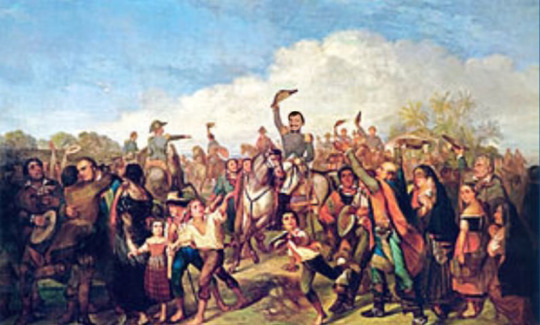
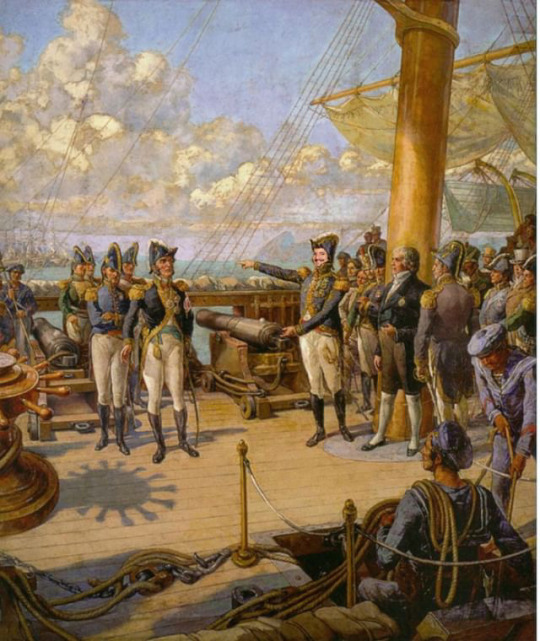
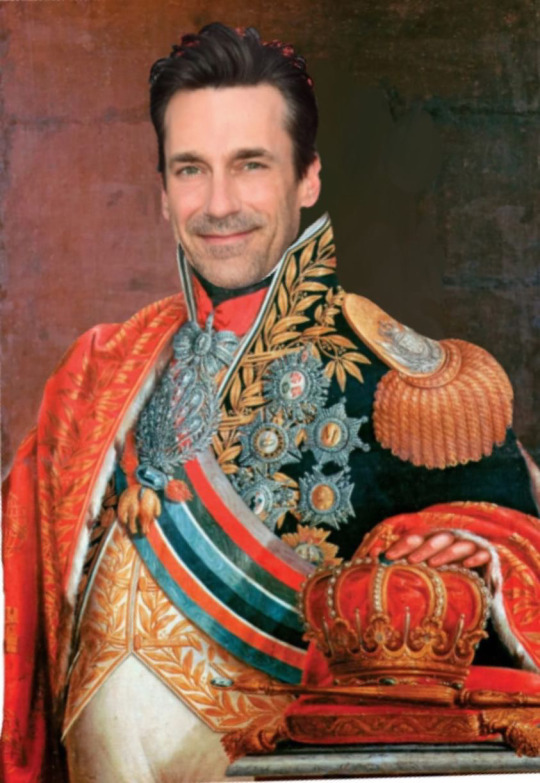
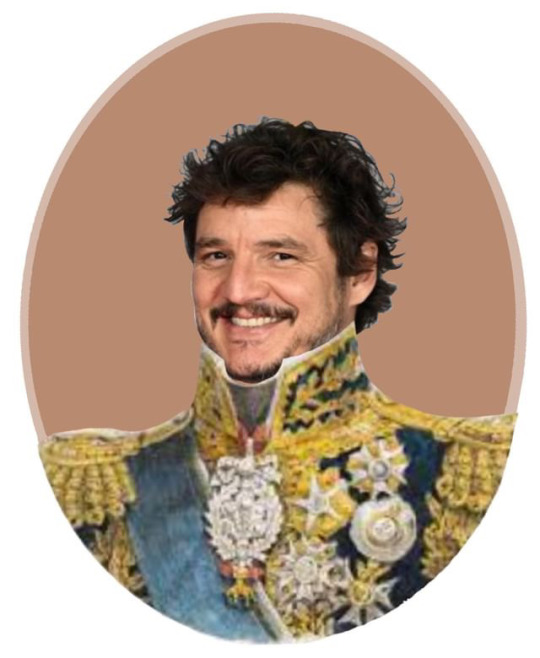
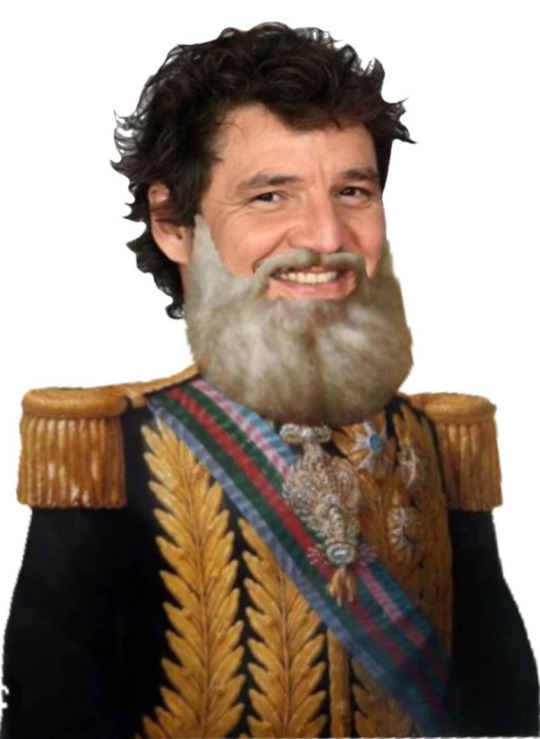
3 notes
·
View notes